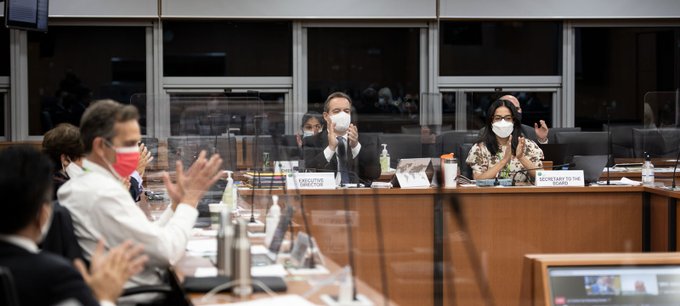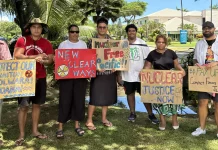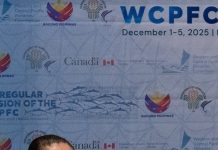The Green Climate Fund (GCF) Board has approved 13 new projects for mitigation and adaptation action, allocating USD 1.2 billion in GCF resources for climate action – a record amount for a single Board meeting. The new projects bring the total size of the GCF portfolio to USD$ 10 billion, representing USD$ 37.2 billion in assets, including co-financing.
Recognising the importance of increasing support for developing countries to adapt to the impacts of climate change, the majority of new funds, 59 percent in grant equivalent terms, are allocated for adaptation. Just over half of the new funding will go to Small Island Developing States, Least Developed Countries, and African States, which are particularly vulnerable to climate change, and 35 percent of the new funds will be channeled via direct access entities working at regional or national level. The newly approved funding proposals also include innovative programmes to catalyse private sector climate finance, particularly in adaptation. The new projects and programmes are listed in full below and more details of each are available on the GCF website.
The four-day virtual Board meeting made a number of important decisions relating to the Fund’s policies and operations. These include a decision to strengthen the capacity of the Secretariat in order to deliver the updated strategic plan. The Board then adopted the Secretariat and Independent Units’ work programmes and budgets for 2022 and approved three entities for re-accreditation. The Board also noted the assessment of GCF’s Simplified Approval Process (SAP) by the Independent Evaluation Unit, and discussed improvements to the SAP.
Co-Chair José De Luna Martínez, from Mexico, stated: “This has been a record year for GCF, with nearly USD 3 billion approved by the Board for urgent climate action. As we head into the crucial COP 26 meeting, the Green Climate Fund is fulfilling its role to deliver support for climate action in developing countries.”
Co-Chair Jean-Christophe Donnellier, from France, stated: “The GCF Board has taken important decisions to strengthen the capacities of the fund that are needed given the rapid growth of the size of the Fund and the necessity to implement the strategic plan. It is important to pursue policy reforms, and that the Fund continues to deliver efficiency gains for the implementation of the portfolio.”
GCF Executive Director Yannick Glemarec stated: “GCF has accelerated the programming of climate finance in 2020 to maintain climate ambition in the context of COVID-19. We are now allocating funds to new projects as soon as they are received, in response to increasing demand from developing countries. The Secretariat is also moving those funds more rapidly and efficiently to implement climate action on the ground, and our report to the Board reflects the increases in the speed of project review and in project implementation that have allowed us to disburse over USD 2 billion to date.”
The following projects were approved during the meeting:
* USD$ 16.6 million for ‘Climate change adaptation solutions for Local Authorities in the Federated States of Micronesia’, undertaken with SPC (FP169);
*USD$ 17.5 million for ‘Enhancing climate resilience in Thailand through effective water management and sustainable agriculture’, undertaken with UNDP (FP170);
*USD$ 21 million for ‘Enhancing Early Warning Systems to build greater resilience to hydro-meteorological hazards in Timor-Leste’, undertaken with UNEP (FP171);
*USD$ 21.1 million for ‘Mitigating GHG emission through modern, efficient and climate friendly clean cooking solutions (CCS)’, undertaken with AEPC in Nepal (FP172);
*USD$ 279 million for ‘The Amazon Bioeconomy Fund: Unlocking private capital by valuing bioeconomy products and services with climate mitigation and adaptation results in the Amazon’, undertaken with IDB in Brazil, Colombia, Ecuador, Guyana, Peru and Suriname (FP173);
*USD$ 174.3 million for ‘Ecosystem-based Adaptation to increase climate resilience in the Central American Dry Corridor and the Arid Zones of the Dominican Republic’, undertaken with CABEI in Costa Rica, the Dominican Republic, El Salvador, Guatemala, Honduras, Nicaragua, and Panama (FP174);
*USD$ 9.5 million for ‘Enhancing community resilience and water security in the Upper Athi River Catchment Area, Kenya’, undertaken with NEMA (FP175);
*USD$ 35.5 million for Hydro-agricultural development with smart agriculture practices resilient to climate change in Niger’, undertaken with BOAD (FP176);
*USD$ 157 million for ‘Cooling Facility’, undertaken by World Bank in Bangladesh, El Salvador, Kenya, Malawi, North Macedonia, Panama, Sao Tome and Principe, Somalia, Sri Lanka (FP177);
*USD$ 150 million for ‘Desert to Power G5 Sahel Facility’, undertaken with AfDB in Burkina Faso, Chad, Mali, Mauritania, and the Niger (FP178);
*USD$ 100 million for ‘Tanzania Agriculture Climate Adaptation Technology Deployment Programme (TACATDP)’, undertaken with CRDB (FP179);
*USD$ 125 million for ‘Global Fund for Coral Reefs Investment Window’, undertaken with PCA in Bahamas, Belize, Brazil, Colombia, the Comoros, Ecuador, Fiji, Guatemala, Jamaica, Jordan, Mexico, Mozambique, Panama, the Philippines, Seychelles, and Sri Lanka (FP180);
*USD$ 100 million for ‘CRAFT – Catalytic Capital for First Private Investment Fund for Adaptation Technologies in Developing Countries’, undertaken with PCA in Bahamas, Brazil, Mexico, Rwanda, South Africa, Trinidad and Tobago (FP181).
The GCF Board approved the reaccreditation applications of the following entities:
*The Environmental Investment Fund (EIF), based in Namibia;
*The International Union for Conservation of Nature (IUCN), based in Switzerland;
* The United Nations Development Programme (UNDP), based in the United States of America.
SOURCE: GCF/PACNEWS


















